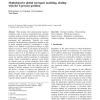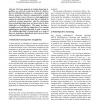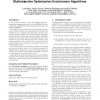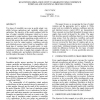1008 search results - page 10 / 202 » Multiobjective process controllability analysis |
128
click to vote
EWC
2010
15 years 24 days ago
2010
When dealing with computationally expensive simulation codes or process measurement data, surrogate modeling methods are firmly established as facilitators for design space explor...
110
Voted
CEC
2005
IEEE
15 years 7 months ago
2005
IEEE
Abstract- The large majority of existing clustering algorithms are centered around the notion of a feature, that is, individual data items are represented by their intrinsic proper...
127
click to vote
GECCO
2007
Springer
15 years 8 months ago
2007
Springer
In this work we present a novel and efficient algorithm– independent stopping criterion, called the MGBM criterion, suitable for Multiobjective Optimization Evolutionary Algorit...
143
click to vote
GECCO
2007
Springer
15 years 4 months ago
2007
Springer
In autonomous agent systems, memory is an important element to handle agent behaviors appropriately. We present the analysis of memory requirements for robotic tasks including wal...
110
click to vote
WSC
2001
2001
Quantifying simulation output variability using confidence intervals and statistical process control
15 years 3 months ago
Two types of variability can occur in model output: variability between replications and variability within each replication. The objective of the model combined with the type of ...




